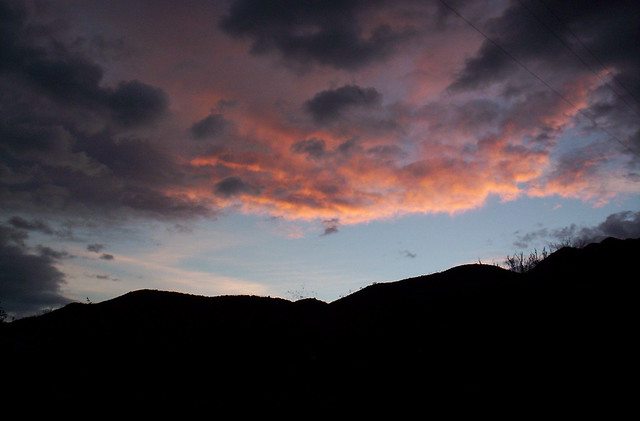 |
| Dawn sky over Tenerife on Monday, November 28th, 2005. |
Today is the first anniversary of Tropical Storm Delta that whipped through the Canary Islands on November 28th and 29th, 2005. Later denominated as an Extratropical Cyclone, though the precise distinction in terms is lost on the "ordinary folk" of these islands. Whatever it was, we remember it for the wake of damage it left, valued at $364+ million, with 7 deaths and 12 disappeared.
Delta was the worst storm that these islands have suffered and local media cannot help but comment on it again today and point out that residents in the Canary Islands still live with the fear that that something similar could happen again. The question, of course, is whether these islands are prepared.
Despite the alerts, nobody took it seriously enough and, for the most part, Delta took the Canary Islands almost completely by surprise. Some 200,000 people in Tenerife, the hardest hit, were left without electricity, a number were also without water and, some of those lacked these basic services for up to a week.
Many point to the lack of provision for such emergencies in the archipelago, remembering that most of the population was left without electricity at some point and that there were no generators on the islands to cope with the situation.
Many suffered damages and loss of electrical appliances, frozen food had to be thrown away, agriculture and business suffered huge financial losses.
 |
| Electric tower fallen. Photo: Mataparda |
One of the most impacting images was that of the fallen electrical pylons, found to be in an "elevated" state of oxidation. Several towers were brought down by the high winds alongside the TF-1 motorway, causing chaos, not just with the electrical supply, but also with the traffic. Finally, yesterday, the parliamentary commission set up to investigate the response to Delta, decided unanimously, that responsibility for bad management falls jointly upon both central and Canary Islands administrations, as well as the electricity company, Unelco-Endesa, for the weaknesses in the Canarian electrical supply system.
Some are interpreting that decision as good news, but I think my friend Bernardo Sagastume at ABC gives us the best analysis on the subject, saying that, "those culpable ... are various and, at the same time, nobody." That was my reading of it too: the commission has been seen to have done it's job, just about, but it carefully avoided upsetting anyone in particular. That is hardly the way to make changes that will really improve the situation for the future.
In particular, the commission's report does recognize that the electrical pylons were in a poor state and only capable of half their designed capacity - for which Unelco was sanctioned - yet, the conclusions of the report fail attribute blame on Unelco for the resultant, prolonged, up to seven days, power outages in Tenerife.
Only the politicians themselves seem to be satisfied with the outcome and, as one would expect here, they also seem to have spent time arguing over what to call the storm, some claiming it was really a hurricane of force 3 or 4.
Central to the issue, of course, is whether the storm should be termed "de fuerza mayor" - what English speaking insurers, even atheist ones, call an "Act of God" - because from that depends who (if anyone) will pay out to those affected.
Specifically too, the estimated damages reported earlier and mentioned in the reports at Wikipedia (English | Spanish), were all well in excess of $300 million (228 million euros at today's rate). Nevertheless, the commission has now valued the global damages caused by Delta at merely 41.7 million euros ($54.8 million).
As to the future, the new president of Unelco, José María Plans, says that energy distribution has improved from the "critical" state it was in a year ago, but the archipelago continues to require new power stations to diversify risks.
We all hope that there will never be another storm of the like of Delta in the Canary Islands, but merely hoping would be foolish in the extreme. Unfortunately, from these conclusions, Canary Islanders are still left merely hoping that what the authorities might do to prepare, if it does occur, is enough and in time.





 After more than 20 years, posts here will now only be occasional (
After more than 20 years, posts here will now only be occasional (